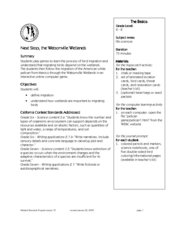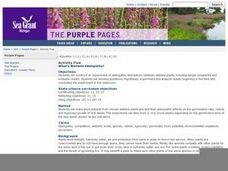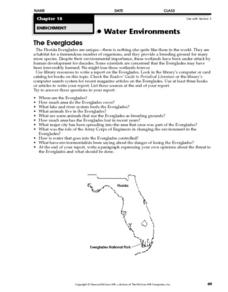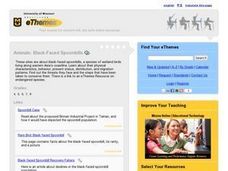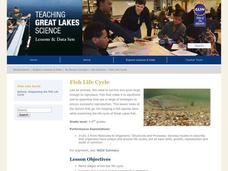Curated OER
Next Stop, the Watsonville Wetlands
Students study bird migrations and the importance of wetlands. In this migration instructional activity students play a game and complete a computer activity.
Curated OER
Wetlands Word Map
In this wetlands word map worksheet, students observe a graphic organizer of the wetlands, climate, animals, plants, and threats to the environment and complete it with detailed information. Students write short answers for five categories.
Curated OER
What's Wetland Allelopathy?
Students study plants and what they need to thrive and survive. They make plant extracts from chosen wetland plants and test their allelopathic effects on the germination rate, radicle growth, and hypocotyl growth of test seeds of other...
Curated OER
World Wetlands Day
In this World Wetlands Day activity, students read or listen to a passage, then match phrases, fill in the blanks, choose the correct words, unscramble words and sentences, put sentences in order, write discussion questions and conduct a...
Curated OER
Everglades
In this wetlands worksheet, students will research and answer 11 questions about the Florida Everglades. Students will create a report.
Curated OER
Coastal Ecosystems: Salt Marshes and Mangroves
What factors drive a coastal ecosystem? Marine biology or environmental studies classes find out by viewing this presentation. They meet the fauna and flora of salt marshes and mangroves. They are familiarized with threats to these...
Curated OER
Project Wetlands
Students develop a joint undertaking designed to solve an environmental problem in their local community. They tackle the problem of erosion of banks and chemical run-off into a nearby lake, which is within walking distance of school.
Curated OER
Conserving the Pantanal
Students discover ways to preserve their environment by identifying threats. In this ecological lesson, students view an EarthWatch DVD and investigate the Brazilian wetland known as Pantanal. Students complete a worksheet about the...
Curated OER
Birds
Students list marine birds in their area and report on the threats made to these species. In this marine life lesson students compare bird count data and argue either for or against its accuracy.
Curated OER
Maintaining Strong Fisheries
Students play a game about the life cycle of a blue crab in order to witness the causes of changes in the crab population and discuss what a resource manager could do to keep a stable crab population. Students then create a game titled...
Curated OER
Seeing a World of Difference
Learners read through the lyrics and listen to a song about biodiversity. Using pictures they draw, they interpret the song according to their prior knowledge. They identify the threats to different regions around the world and create...
Curated OER
Make Way for Wild Migrants
Students discuss the threats facing migratory species and track the seasonal journeys of wildlife in real space and in cyberspace. Once they have gathered information from several sources, they create a portfolio to share with others...
Curated OER
Precious Water: Is it a Need, a Right, or a Commodity?
Students determine whether water is a need, a right, or a commodity. In this water lesson, students investigate land and water ecosystems through activities. Students also discover water as a resource and energy source as they observe...
Curated OER
Relating Number of Insect Species to Water Quality
Students are asked to respond to questions such as:" Have there been surveys of the area to inventory the species?" (For example, for a wetland area, do they know what amphibians live there and how abundant they are?) Are there any...
Prince William Network
The Incredible Journey
Divide your school gym into breeding grounds and non-breeding grounds so that your zoologists can play a game simulating the seasonal migration of shorebirds. Players pick one of the included game cards and follow its directions, which...
NOAA
Marine Policy
Save the oceans! The 22nd installment of a 23-part NOAA Enrichment in Marine sciences and Oceanography (NEMO) program focuses on laws and marine policy. Pupils take part in an activity investigating fisheries stock data.
Curated OER
Soil Runoff Challenge
Learners find ways to decrease soil runoff for an African Village as a part of a Peace Corps project. In this soil runoff lesson, students play a soil runoff challenge online. Learners complete online activities and view a slide show to...
Curated OER
Community Problem Solving
Students use community problem solving to solve a littering problem in the community of San Carlos. Students use a Role Play Description to learn this process.
Curated OER
Water and Land Ecosystems
Students investigate the differences between a land and aquatic ecosystem. They use the information in order to present it in an assessment. There are target questions that can be used to guide research, lead a classroom discussion, or...
Curated OER
Caution: Fix It!
Students explore the concept of environmental stewardship. In this science lesson plan, students investigate events that have harmed coastal resources and how human activity has restored coastal resources.
Curated OER
Animals: Black-Faced Spoonbills
Students analyze the physical characteristics, behavior, distribution and migration patterns of the black-faced spoonbills.
Michigan Sea Grant
Fish Life Cycle
Fish are no different when it comes to a living being's primary objective—to reproduce. They do differ, including from fish species to fish species, in their life cycles, survival tactics and reproductive strategies. After discussion of...
Curated OER
Saving Habitat
Students pick an animal native to Maryland and research how populations of that animal might be affected by land use changes over the past thirty years. They predict population trends for the next thirty years.


